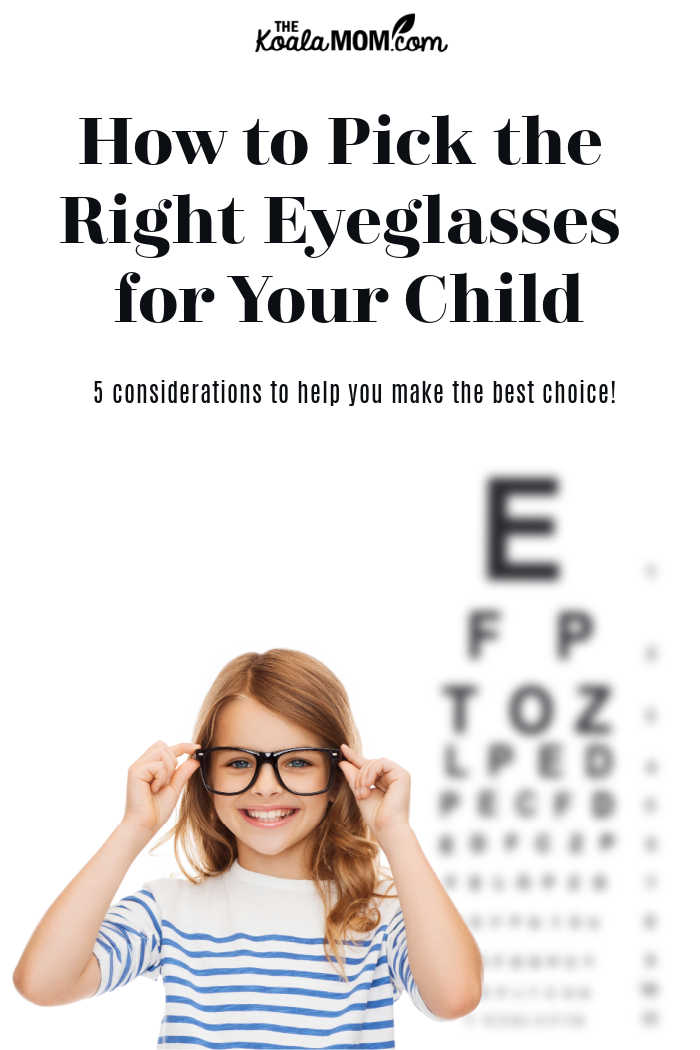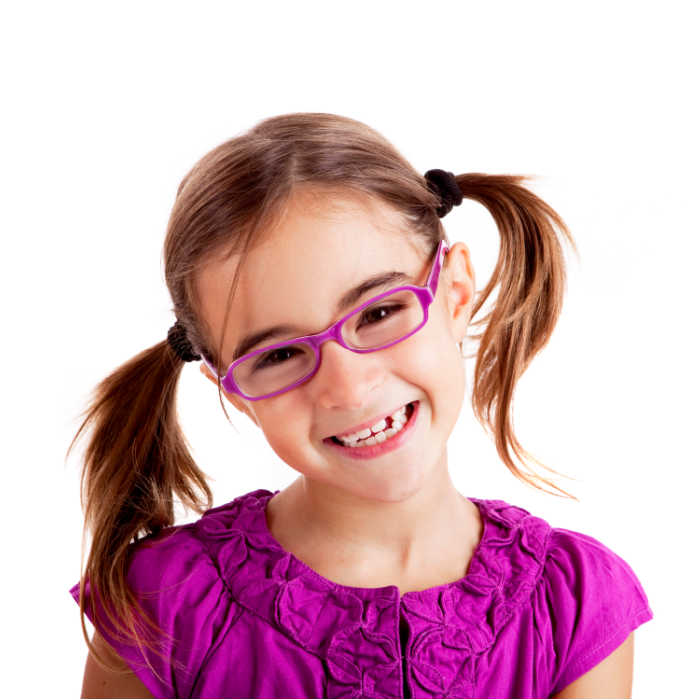If you and your family just found out your child needs glasses, you likely have some big questions. Your optometrist and optician can help you, but picking the right eyeglasses for your child is going to be very different than choosing eyeglasses for yourself.
Just like adults, kids are capable of being very indecisive… or very stubborn! Depending on their age, they will have their own opinion about what glasses to wear—and even whether they want to wear glasses. Here are some things you should consider in choosing glasses for your child.

This post contains affiliate links; as an Amazon associate, I earn from qualifying purchases.
Speak to a Professional
Picking the right eyeglasses for your child starts with a consultation with an expert optician. Your optometrist may have in-house opticians or be able to refer you to a good optician nearby. Shops and stores can guide you along the journey of picking the right frame, but not every shop is as reliable when it comes down to understanding what prescription your kid needs.
An optician will be able to tell you the exact prescription needed and address other concerns with your child’s glasses, including make sure that they fit properly. Most opticians also offer free adjustments, so if your child starts to complain that the glasses are bothering their nose or ears, you can return to the optician for a professional adjustment. If the glasses cause your child pain, they’ll be less likely to wear them.
As a child, I remember frequent visits to my optician for glasses adjustments. A bump in the face while playing sports with my brothers could knock my nose piece flat, which could affect how my glasses sat on my ears. Next time we were in town running errands, we’d swing past the optician to get my glasses adjusted. My glasses always felt much better after they’d checked my nose piece and ears and made sure everything was fitting properly again.
While you can buy discount glasses online (and I have both done this), I don’t recommend this for kids’ glasses. You can’t try online glasses before buying them, so it’s harder to find a pair of glasses that really looks good. You don’t have the tools necessary to measure pupil distance or to ensure that the glasses fit your child properly once they arrive. And when those glasses need adjustment, you have no one to help.
If the prescription isn’t quite right, your child is also less likely to notice blurriness or other vision problems or to have the words to explain these to you so that you can get the prescription checked or get different glasses. A professional optician will check the prescription multiple times before and after ordering, and while fitting, to make sure that it’s what your child needs.
Comfort and Safety are Crucial
Most adults focus on the appearance of their glasses. And once you’ve been wearing glasses for a few years (like me), you know what shape and size and style of frames you like. However, when it comes down to picking the right eyeglasses for a child, the situation can differ. Of course, even children are concerned with the way they look (and may think that glasses either make them look better or worry that glasses make them look silly), but their energetic lifestyle is also something that parents should consider.
Kids tend to play more, be more physical than adults, and, often, fall more. All this can lead to broken glasses, which could be seriously dangerous for your kids. You’ll want to ask about durability for the frames you’re considering, and how easily they bend. More styles are being made with tougher materials for kids, so your optician should be able to guide you to glasses that will stand up to your child’s active lifestyle.
With the increasing use of screens in classrooms, you may also want to ask your child’s optician about blue light glasses. Most lenses can be given a blue light coating to help reduce to amount of blue light your child is exposed to. While blue light is not harmful, it may affect your child’s sleep patterns, so it can be helpful to limit blue light before bedtime. If your child needs to be doing a lot of homework at the end of the day on his computer, then having blue light reducing glasses may be useful.
Psssst… if your child is really unsure about wearing glasses, drop by your local bookstore or library to pick up a few books to read with him about why glasses are necessary and cool. For older children, From Anna by Jean Little is an excellent story about a young girl in the 1930s whose life improves drastically when she gets glasses.
Pick a Modern Style
Don’t forget that your child will need to wear their glasses at all times. Therefore, picking a comfortable frame that will make your kids feel at ease in any circumstance is a must. Does your child want big bright frames, or a more subtle pair that’s less obvious? Try to listen to their thoughts and concerns about wearing glasses.

Wearing glasses was not considered cool for anybody—until today! Indeed, the market understood the need to transform this accessory into a beauty item that can truly accentuate some important facial features. That is why not all glasses are suitable for everybody, and picking the right pair is paramount.
However, when it comes down to kids, not all styles are aesthetically pleasing or complimentary. And if they don’t feel comfortable in it, they might not want to wear them! For something so important, it is essential to pick a suitable pair for them and have all the characteristics that make it a comfortable and safe accessory.
I remember being excited when I found out that I needed glasses. I’d always thought myself rather plain, and I hoped that glasses would make me look better. I wanted a cool pair of frames. As a child, however, functionality usually won out. My parents wanted me to pick a frame that I could wear for years, to save them money. Even as an adult, I’ve hesitated about picking cool, brightly-coloured frames, wondering if they’ll clash with something I wear.
While your optician can help with advice on the frames, the choice comes down to you and your child. You know your child’s preferences best. It may be helpful to start by looking online, as you and your child can browse glasses at home and get an idea about what your preferences are without pressure from a salesperson. Your child may be shy in front of an optician, but more willing to speak openly to you alone.
Pay Extra Attention to the Frame
There has always been a discussion regarding whether plastic or metal frames are more suitable for kids’ lifestyles. Historically, plastic has always been considered safer, more durable, and more versatile. However, today, manufacturers have created metal frames that are just as good and suitable.
Indeed, these frames are resistant to impact, wear and tear, and natural elements. These characteristics of metal eyeglasses, as well as the fact that the lightweight metal frame will give the glasses a more sophisticated look, have made them the favorite solution for both kids and adults. When mounted together with photochromic lenses, they can make a pair of eyeglasses look very cool!
Have a Plan B in Place
You can never be sure that your young ones won’t lose or break their brand new pair of glasses. If buying them has meant a considerable investment on your part, you might consider having a plan B in place—just in case anything happens. Buying a warranty with the glasses is one option, if it’s offered by your optician or eyeglasses shop. This will cover the financial aspect of the loss.
I remember the first time I broke my glasses. We were visiting my grandparents, and for some reason I put my glasses down on the end of my bed while I did something else. Then I turned around and knelt on my glasses, breaking off both arms. I was horrified! Nearly crying, I took my glasses out to tell my parents what I’d done, worried they’d be super angry with me. Instead, they laughed a little bit, told me to put my glasses in a better place next time, and promised me new glasses as soon as we got home. I learned then to be careful where I put my glasses down, and don’t remember breaking them again.
Keeping another pair of glasses ready for any eventuality (even if not as good) can help you look after your kids’ immediate need upon losing their own glasses! Two for one sales are always popular with glasses. When I was a kid, one of my friends was constantly losing her glasses. Her parents always bought her two pairs of glasses because they knew she’d lose them quickly. Again, you know your child’s personality. Is she a responsible, cautious child who will take care of her glasses, or a more spontaneous, careless child who will likely lose them quickly? Plan ahead!
Other Accessories to Consider
Now that your child has glasses, help her learn how to care for them properly. Get a set of cute glasses’ cleaning cloths for your child to keep with his backpack for easily wiping smudged glasses. Remind your child not to use her shirt, tissues, or other fabrics to wipe her glasses, as these can be rough and scratch the lenses. If your child is very active in sports, it may be a good idea to get a glasses strap to wear to avoid losing glasses.
Do your kids need glasses? How did you pick the right eyeglasses for your child?

No Responses Yet